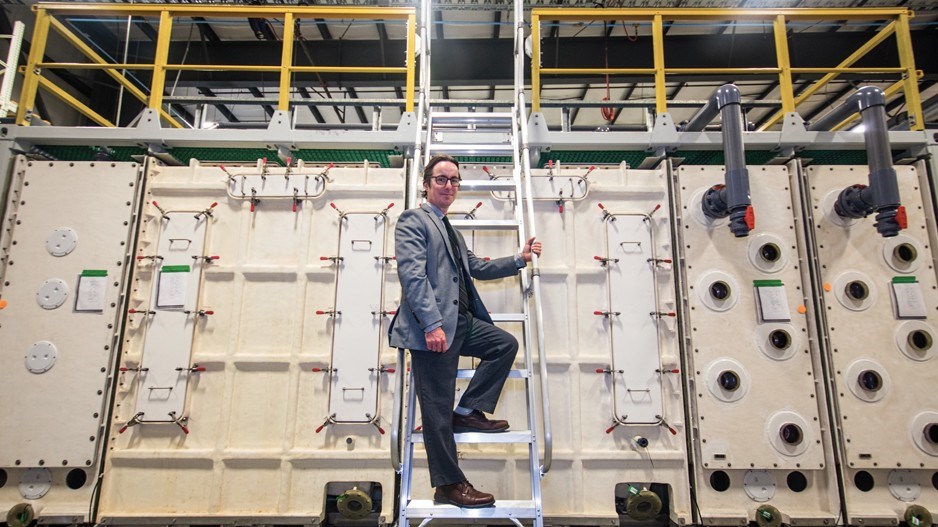Since February, two B.C. clean-technology companies have raised a total of $200 million.
Loop Energy (TSX:LPEN), a hydrogen fuel cell company, debuted on the Toronto Stock Exchange in a $100 million initial public offering, and in March Svante, a carbon capture company, concluded a $100 million private equity raise.
They were the biggest financings for B.C. clean-tech companies since 2019, when Carbon Engineering, which is the direct air carbon capture space, raised $90 million in private equity and General Fusion raised $85 million.
Meanwhile, though less headline grabbing, B.C.’s water-tech companies have been busy opening new treatment plants, landing new contracts and expanding into new markets.
BQE Water (TSX-V:BQE) commissioned new mine waste and mineral reclamation plants in China, Saltworks has inked deals with lithium producers to use its technology to refine raw lithium chloride into battery-grade product, and Axine Water Technologies last year opened a new assembly plant in Metro Vancouver, where its waste-water treatment systems are built and tested, and has inked a number of recent deals with big pharmaceutical companies.
“A huge number of our customers are in Europe, so we just opened up in Europe,” said Jonathan Rhone, CEO of Axine and chairman of the BC Cleantech CEO Alliance.
Clean tech, it appears, is back in favour among venture capital and institutional investors.
“It feels like we’re moving into a bit of a golden age for clean tech,” said Rhone, citing the European Green Deal and recent environmental and climate commitments by the Joe Biden administration as accelerants.
“The global economy is unleashing an enormous amount of capital, and that’s unleashing a lot of innovation. We’re seeing a massive gear shift happening in the U.S.”
Jeanette Jackson, CEO of the Foresight clean-tech accelerator, believes the sector could be poised for significant growth.
“There’s more late-stage funding than ever,” she said. “In fact, it’s quite competitive between the venture funds to get access to those later-stage companies. The valuations of them are being driven up.”
Water decontamination and remediation is one of three clean-tech subsectors that have developed in B.C. Some of the leading players in that space are B.C. companies like Axine, Ostara Nutrient Recovery Technologies, BQE Water, Saltworks and a relative newcomer called CarboNet, which is focused on decontaminating water in hydraulic fracking.
B.C. is also a hydrogen fuel cell and battery hub, with companies like Ballard Power Systems (TSX:BLRD), Loop Energy, Hydrogen Technology and Energy Corp. and Corvus Energy.
More recently, B.C. has emerged as a carbon capture technology innovator, with companies like Carbon Engineering and Svante, and research institutes like Carbon Capture and Conversion Institute, which has research and testing facilities in Richmond.
“We are Silicon Valley North for carbon capture,” Rhone said.
In 2016, B.C.’s 273 clean-tech companies directly employed 8,560 people and generated $1.8 billion in revenue, according to a 2017 KPMG report. KPMG reported the sector growing to 350 companies employing 9,600, with revenues of $2.4 billion in 2019.
Much of what the clean-tech sector does is provide environmental services for heavy industries like oil and gas, mining and chemicals.
The complex engineering involved in carbon capture or water treatment plants is capital intensive, and clean-tech companies have struggled in the past to attract the venture capital needed to get to the demonstration phase.
Following the 2008 financial crisis and the spectacular 2011 flame-out of clean-tech darling, Solyndra, venture capital largely shunned clean-tech for about a decade. But the sector is starting to see renewed interest from venture capital and institutional investors.
Shareholders are demanding better ESG (environmental, social and corporate governance) performance from their companies, which has resulted in more partnership agreements and contracts with big industrial customers.
“What’s driving the water sector is more institutional shareholders,” said Ben Sparrow, CEO and co-founder of Saltworks, which specializes in cleaning up highly polluted industrial waste water. “Institutional shareholders, they’re asking their companies to better quantify their carbon and water related risks.”
Marty Reed, CEO of clean-tech venture capital firm Evok Innovations, agrees.
“I think the emphasis on ESG has just ramped up exponentially over the last couple of years,” he said. “And the easiest way to translate that is on the [greenhouse gases] side. You are seeing enormous pressure on firms across all sectors to announce commitments of net zero in ever-shorter timeframes.”
Evok was founded in 2016 with $100 million in funding from Suncor Energy (TSX:SU) and Cenovus Energy (TSX:CVE) and has invested in more than a dozen clean-tech startups in North America. At least one of its investments has already paid off.
DarkVision Technologies, one of the companies funded by Evok Innovations, developed imaging technology for oil and gas wells. Last year, Koch Engineered Solutions, a subsidiary of the American industrial giant Koch Industries, took a majority stake in the North Vancouver company.
“We last year had a very nice exit with DarkVision, so those proceeds come back, and we’re now deploying those,” Reed said.
Rhone added that clean-tech firms are “starting to see a lot more activity in all stages of investment.”
“The scale of capital in clean-tech, right from early stage capital to growth stage to non-diluted sources of funding, is really expanding. It’s a pretty exciting time in clean tech right now.” •




